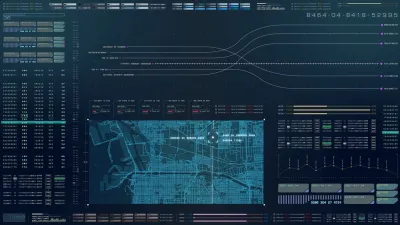Adie Tomer, of the Brookings Institution, writes about the role of artificial intelligence in the new digital age transforming cities.

The new industrial age of the digital era "represents an entirely new platform on top of which many everyday activities operate," according to a brief by Adie Tomer. One of the most important of the new developments of the new digital capabilities of cities is artificial intelligence (AI).
According to Tomer, there is a lot of interest and mystery surrounding AI, including just how AI will fit into the built environment. "Even though AI is still in its infant stages, we already encounter it on a daily basis," explains Tomer. "When your video conference shifts the microphone to pick up the speaker’s voice, when your smartphone automatically reroutes you around traffic, when your thermostat automatically lowers the air conditioning on a cool day—that’s all AI in action."
The bulk of Tomer's article discusses the potential for AI to address and mitigate some of the most pressing challenges facing cities, like climate change and urban resilience, growth and attraction of "tradable" industries, rising inequality, and more.
According to Tomer, there's no need to wait for AI to arrive in cities—it's already built into many day-to-day functions urban residents take for granted (the use of machine learning to better predict future bus arrivals for the mobile app Transit, for instance). But:
Continued experimentation with pilot AI projects and complementary policies are essential to build digital cities that benefit all people. But to deliver such shared prosperity, AI is only a secondary intervention. The first step is the same as it always was, no matter the technological era: Local leadership, from civic groups to elected officials to the business community, must collaborate to codify the shared challenges cities want technology to address. It’s only with a common sense of purpose that cities can tap AI’s full promise.
FULL STORY: Artificial intelligence in America’s digital city

Maui's Vacation Rental Debate Turns Ugly
Verbal attacks, misinformation campaigns and fistfights plague a high-stakes debate to convert thousands of vacation rentals into long-term housing.

Planetizen Federal Action Tracker
A weekly monitor of how Trump’s orders and actions are impacting planners and planning in America.

Chicago’s Ghost Rails
Just beneath the surface of the modern city lie the remnants of its expansive early 20th-century streetcar system.

Bend, Oregon Zoning Reforms Prioritize Small-Scale Housing
The city altered its zoning code to allow multi-family housing and eliminated parking mandates citywide.

Amtrak Cutting Jobs, Funding to High-Speed Rail
The agency plans to cut 10 percent of its workforce and has confirmed it will not fund new high-speed rail projects.

LA Denies Basic Services to Unhoused Residents
The city has repeatedly failed to respond to requests for trash pickup at encampment sites, and eliminated a program that provided mobile showers and toilets.
Urban Design for Planners 1: Software Tools
This six-course series explores essential urban design concepts using open source software and equips planners with the tools they need to participate fully in the urban design process.
Planning for Universal Design
Learn the tools for implementing Universal Design in planning regulations.
planning NEXT
Appalachian Highlands Housing Partners
Mpact (founded as Rail~Volution)
City of Camden Redevelopment Agency
City of Astoria
City of Portland
City of Laramie





























